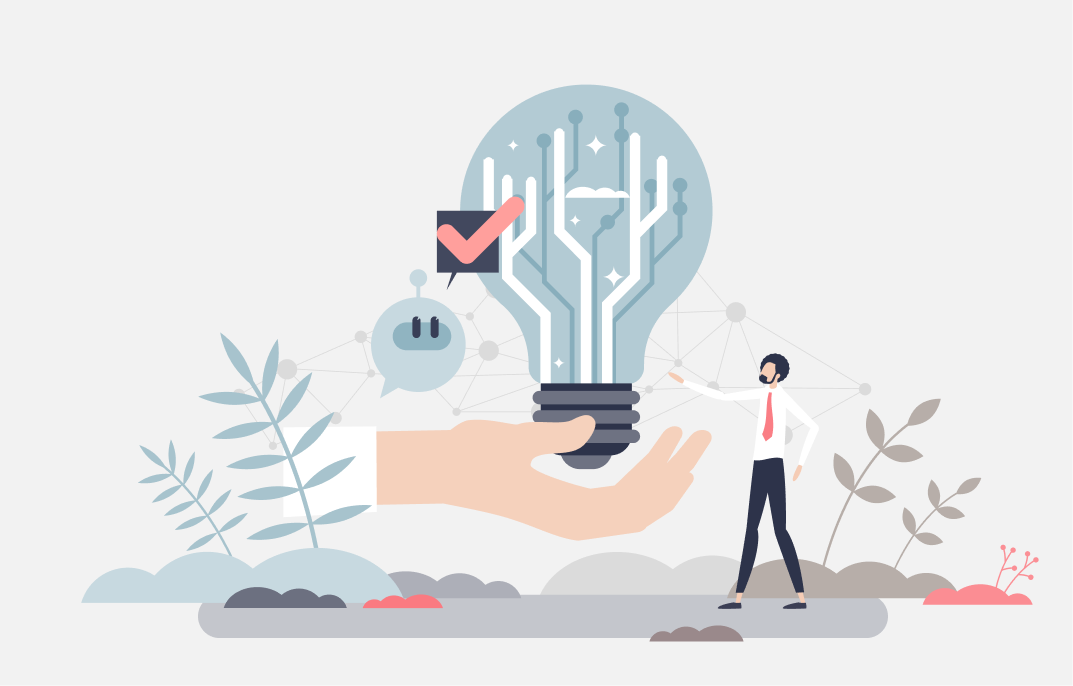The modern educational environment is changing fast. The reason is simple. People have varying backgrounds, learning styles, and pace preferences. So, there is no one-fits-all solution. Adaptive learning platforms offer an alternative by making it fit the individual learner, not vice versa. Moreover, such personalized solutions achieve even more with the help of artificial intelligence (AI), which makes them a powerful tool that transforms education, making it more engaging, effective, and accessible.
This article overviews adaptive learning platforms, explains their key aspects, how AI works in those systems, and the benefits for institutions, businesses, and learners. Let’s start!

Understanding Adaptive Learning Platforms
Adaptive learning platforms refer to a group of intelligent systems that constantly monitor the educational material, including each learner's performance, level of understanding, and engagement. Based on this data, they adjust the material's choice and pace to improve the learning journey. Hence, they use artificial intelligence to perform adaptability functions.
An adaptive system generally consists of a content repository, learner and instructional models, and an adaptation engine. The content repository provides explicit information. The learner model monitors individual responses and learning styles. In turn, the instructional model determines what, how, and in what order information should be presented. The adaptation engine processes all this information and adjusts the educational process.
The Role of AI in Education Technology
AI drives adaptive learning platforms, enabling them to provide tailored, intelligent education experiences based on each learner’s needs and preferences. These platforms are capable of personalization and adaptability that would not be possible through traditional educational methods, thanks to a collection of AI technologies. Some of the most prominent AI technologies employed in education include the following:
Machine Learning (ML)
The ML algorithms examine students’ behavior, achievements, and personal preferences. So, the platform modifies the learning flow to optimize it dynamically. ML models can differentiate patterns, forecast results, and make data-driven choices, such as changing content difficulty, speed, or presentation style based on each student’s behaviors and requests.
Natural Language Processing (NLP)
NLP makes it simple for computers to comprehend, interpret, and respond to human language. It is used to power intelligent tutoring systems and conversational interfaces on adaptive platforms to interpret students’ questions, offer personalized feedback, or even communicate with students in the same language to explain ideas. NLP can also be used to examine vast amounts of educational material and concentrate only on the crucial things for the learner.
Predictive Analytics
It uses analytic methods to enable people to make educated assumptions and foresee future developments. In the context of adaptive platforms, this technology predicts students’ actions or areas in which they struggle the most, allowing the machine to anticipate educational difficulties and take action to avoid them.
Computer Vision
This technology helps to interpret and understand digital images or videos. This opens various possibilities for interactive and immersive experiences. The combination of computer vision and adaptive learning can be used when the computer vision recognizes the learner’s handwriting of mathematical equations, diagrams, or even illustrations. It could interpret if the learner is doing something wrong or correct and give the learner feedback in actual real-time. Another example is that a camera feed from the device can be utilized to analyze and identify students’ facial expressions and other body language in addition to computer vision. Then, it could identify whether the student is engaged or uninterested, which could inform the system to change the learner’s focus.
How AI-Powered Adaptive Learning Solves Educational Challenges?
Education systems face many challenges, ranging from resource and cost to ineffective learning models and disinterested learners. Traditional systems often use a one-size-fits-all model that is inefficient for modern learners’ goals. Nonetheless, AI-based adaptive learning platforms transform how we tackle these issues and reimagine how education works. Below are the major problems adaptive learning powered by AI tackles in our education today:
Maximizes Training Resources and Minimizes Costs
AI-driven adaptive learning platforms help to optimize resource utilization is through eliminating the need for extensive instructor-led training and the costs related to traditional classroom-based approaches. Due to content delivery and automation of personalization, fewer instructors can serve more learners, which ensures substantial cost savings for businesses and educational facilities.
Enhances Knowledge Retention and Long-Term Skills Development
AI adapts to keep users engaged by reviewing past performances, strengths, and weaknesses and delving into personalizing content according to users' learning styles. Learning occurs in an adaptive approach using these platforms because the course remains moving forward, and learning becomes better retained and developed in terms of skills for the long term, thus adapting to real-world scenarios.
Boosts Engagement and Fosters a Culture of Continuous Learning
Ensuring learners remain involved, invested, and motivated has always been one of the biggest hurdles in education. AI-powered adaptive learning platforms tackle this issue head-on by letting learners engage with the content at their own pace, experiment with gamification aspects, and enjoy interactive learning experiences catering to their tastes and skill levels. As a result, not only are learners more engaged with the material but individuals and corporations can also promote a culture of continuous learning and self-improvement in which learners are encouraged to participate actively in the learning process.
Increases Time Efficiency and Reduces Training Duration
AI-based adaptive learning platforms are designed to focus only on the areas requiring additional effort, while skipping well-mastered information. Such an approach makes training more time-efficient, reducing the time required to learn new skills. At the same time, instead of artificially speeding up the process or slowing it down, everyone can study the material at their own pace, ensuring the thorough mastery of the necessary skills and knowledge.
Provides Deep Analytics for Tracking Training Effectiveness and Performance
All AI-driven platforms produce detailed analytics on learner performance, progress, and levels of engagement. This provides organizational leadership and educators with the data necessary to assess the effectiveness of their training programs fully. The generated analytics may reveal problematic areas where learner competence is low and allow for data-driven adjustment of some elements of the learning process. Moreover, such information can guide the development of new curricula, the prioritization of educational resources, and the development of training strategies to achieve specific outcomes.

Must-Have Features for an AI-Powered Adaptive Learning Platform
To unlock the full potential of AI in education technology, the adaptive learning platform should include several essential features. Let’s briefly overview the main ones one by one.

- Adaptive learning. This feature helps to adjust content, pace, and delivery in real-time based on learner performance and preferences.
- Intelligent recommendations. AI-driven learning materials, courses, and learning advice are recommended according to one’s learning goals and performance data.
- NLP for queries. NLP allows intelligent tutoring and the development of a conversational interface to chat with learners who have questions.
- Analytics. This feature tracks individual and cohort performance to determine their strengths and weaknesses and evaluate the effectiveness of designed learning programs.
- Text-to-audio content. It converts written content into an audio format through AI-powered text-to-speech capabilities. This option appeals to people with different l preferences and accessibility needs.
- Gamification. This ensures badges, leaderboards, and challenges that can encourage users to become more engaged.
- Automated grading. This feature corrects the learner assignments, quizzes, and projects, giving students real-time to rectify and minimize the amount of work for the instructor.
Top 5 AI-Based Learning Platforms
Here are some of the top AI-based learning platforms leading the charge in the EdTech field:

Embibe
Embibe is an AI-powered adaptive learning platform that optimizes and personalizes learning for every student. It uses ML algorithms to process students’ performance data and their strong and weak areas, develop study timetables, practice exams, and provide immediate feedback. Using an AI technique, Embibe ensures students’ access to the focused instruction, coaching, and mentoring they need to perform well and grasp topics more thoroughly.
Duolingo
Duolingo has completely changed the approach to learning a language. The product's most striking feature is AI and adaptive learning technologies, which dynamically and engagingly adjust the lesson plan to the specific student. The AI algorithms track the student’s performance, pinpoint weak areas in learning, and scale the content or speed to match the learner’s capacity. Combined with the gamification motif, interactive lessons, and tailored responses, Duolingo has become a fun and rewarding experience.
Prodigy Math
Prodigy Math is an adaptive math learning platform designed to blend ML, video games, and personalization. This approach allows embedding the math exercises within a captivating and enjoyable gaming environment, making math less stressful and entertaining. The gaming environments are specifically crafted to engage students with exciting quests, combats, and rewards to be redeemed. The platform’s AI algorithms actively track the student’s progress, learn the student’s abilities, and provide personalized feedback and support. Each student accesses a learning platform adjusted to meet their pace and capacity.
Docebo
Docebo is a next-generation learning management system that uses AI to improve learning. It tailors educational material based on learner needs and performance. In this case, Docebo’s AI algorithms make intelligent content recommendations, which suggest relevant material to the learners. The system can provide insights into engagement, progress, and performance through AI-powered analytics, which can help improve training and offer better results.
Paradiso Solutions
Paradiso Solutions is a top AI development company that builds bespoke AI-powered adaptive platforms and educational software solutions for businesses and academic organizations. Using ML, NLP, and predictive analytics, Paradiso Solutions designs smart, adaptable systems that meet the specific needs of all clients. Their AI-powered applications, including personalized learning, intelligent tutoring, auto-grading, and complete analytics, enable organizations to provide excellent, efficient, and cost-effective training.
“Adaptive learning platforms offer an alternative by making it fit the individual learner, not vice versa, achieving even more with the help of artificial intelligence (AI).”

Conclusion
AI software development is changing worldwide education technology, developing a horizon in which personalized, enjoyable, and successful experiences are achievable. AI technologies empower these platforms to achieve individual learners' desires, interests, and capabilities. This way, you can transform learning into continuous education in everything you do and everything you aspire to achieve in a manner that optimizes your allocated resources.
Whether you’re an educational project that wants to enhance its learning strategy or a company that wants to boost its people’s training and career advancement, AI-driven adaptive learning platforms have something for everyone.
Looking to implement AI in your learning platform? Artificial intelligence development company Codebridge is here to help you. Contact us, and we’ll get back to you promptly.
FAQ
What is an adaptive learning platform in education?
An adaptive learning platform is an AI-driven system that personalizes education by analyzing each learner’s performance, pace, and style. It adjusts content in real time, ensuring a more effective and engaging learning experience compared to traditional one-size-fits-all methods.
How does AI improve adaptive learning platforms?
AI technologies like machine learning, NLP, and predictive analytics allow adaptive platforms to analyze student behavior, predict challenges, and adjust lessons instantly. This makes education more personalized, efficient, and accessible for learners of all levels.
What are the benefits of AI-based adaptive learning for businesses?
AI-powered adaptive platforms reduce training costs, increase efficiency, and provide deep analytics on employee performance. They also boost engagement and ensure long-term skills retention, helping companies build a culture of continuous learning.
Why is adaptive learning more effective than traditional education methods?
Unlike traditional education, adaptive learning focuses only on areas where the learner needs improvement while skipping mastered material. This makes training faster, more engaging, and results in better knowledge retention.
What are the top AI-based adaptive learning platforms today?
Some of the leading AI-powered adaptive learning platforms include Duolingo, Embibe, Prodigy Math, Docebo, and Paradiso Solutions. These systems use AI to personalize content, enhance engagement, and improve learning outcomes for both students and professionals.
What are adaptive learning platforms?
Adaptive learning platforms use AI and data analytics to personalize educational content based on individual learner behavior, performance, and preferences. They adjust learning paths in real time to meet each student’s needs.
How does AI improve personalization in learning platforms?
AI analyzes user interactions, progress, and assessment results to recommend content, adjust difficulty levels, and provide targeted feedback, creating a more effective learning experience.
What benefits do adaptive learning platforms offer educators and students?
Students receive customized learning experiences that improve engagement and outcomes, while educators gain insights into learner progress and areas that need intervention.
Which educational settings benefit most from adaptive learning technologies?
Adaptive learning is valuable in K–12 education, higher education, corporate training, and professional certification programs where learners have diverse skills and learning speeds.
What challenges are associated with implementing adaptive learning platforms?
Challenges include data privacy concerns, algorithm bias, content quality, and integration with existing learning systems. Proper governance and transparency are essential.
How will adaptive learning platforms shape the future of education?
As AI advances, adaptive platforms will deliver more accurate personalization, support lifelong learning, and make education more accessible and effective worldwide.









.avif)



.avif)

.avif)


